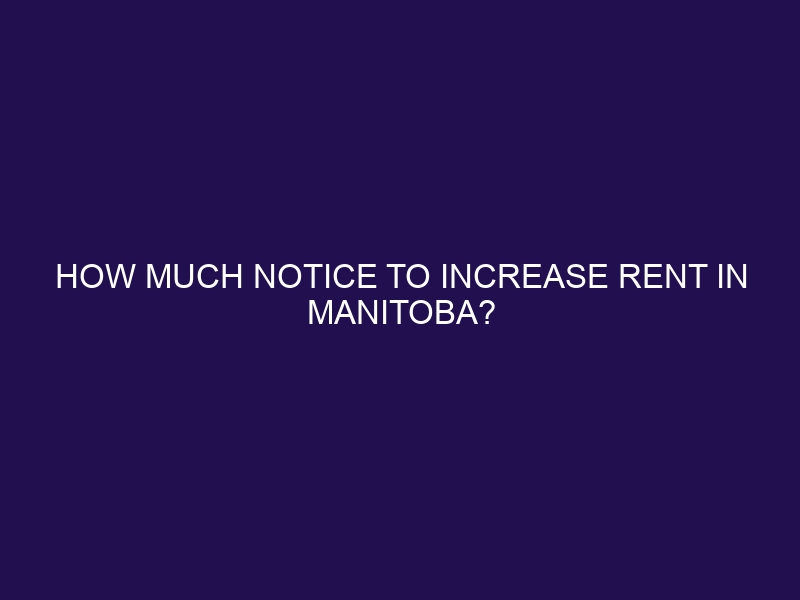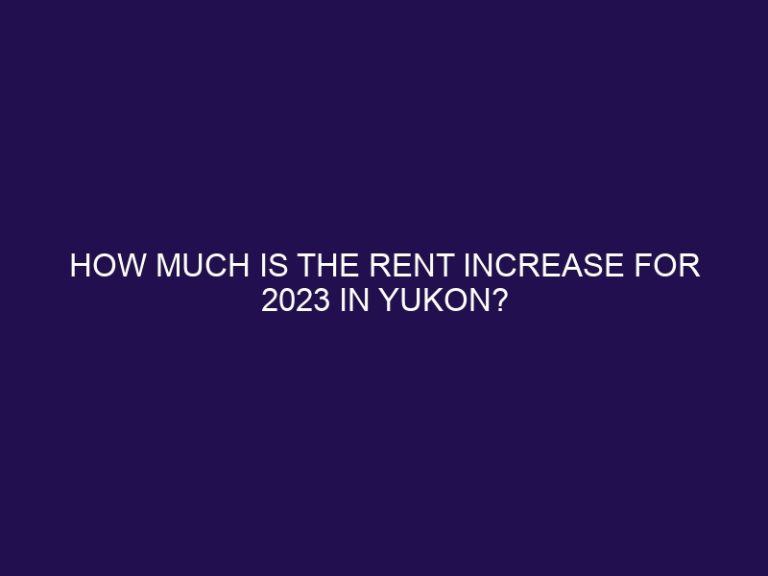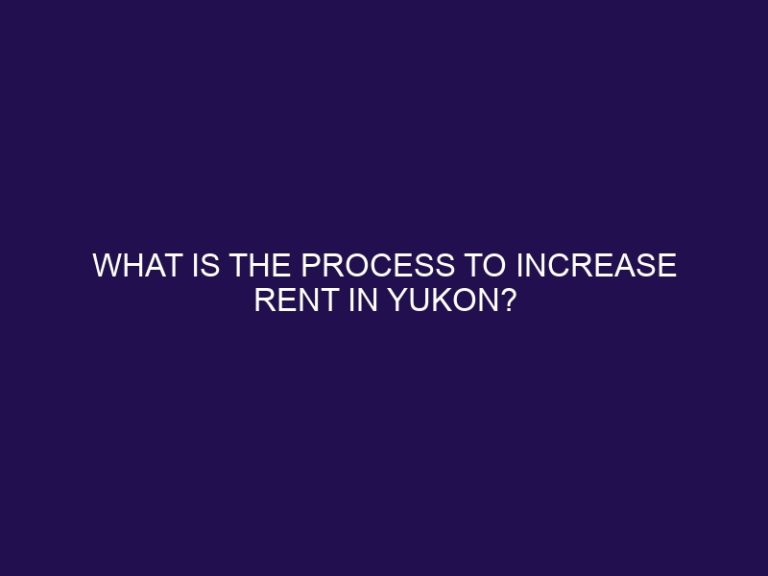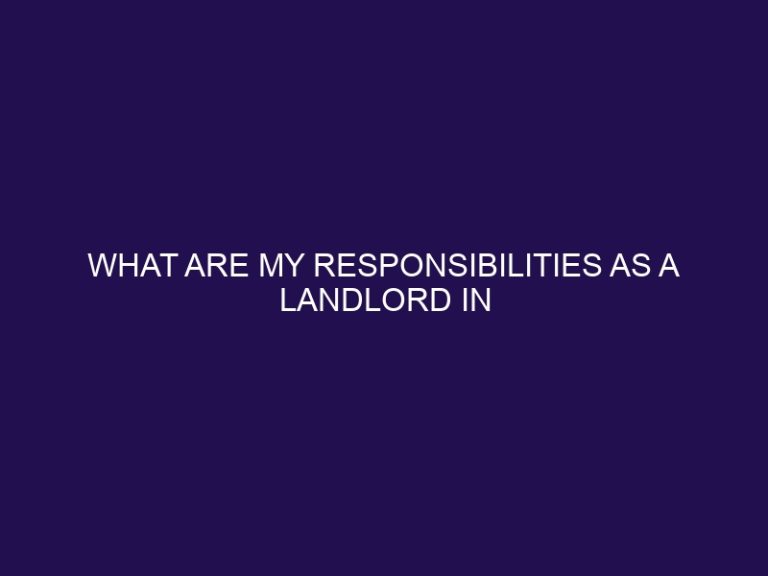How much notice to increase rent in Manitoba?
.jpg)
“Rent increase laws can vary from province to province, and in Manitoba, it’s essential for both landlords and tenants to understand the regulations in place. The Residential Tenancies Act governs the rights and responsibilities of landlords and tenants in Manitoba. Familiarizing yourself with the legislation is crucial to ensure compliance and avoid any legal issues.
When it comes to increasing rent in Manitoba, specific notice periods must be followed. For month-to-month tenancies, landlords are required to provide proper notice to tenants before implementing a rent increase. The notice periods may differ for fixed-term tenancies, so it’s important to be aware of the specific guidelines.
However, there are exceptions to the notice periods in certain circumstances. Landlords may be permitted to increase rent above the guideline under specific conditions. there might be special circumstances that modify the notice periods, so it’s important to understand these nuances.
If you receive an improper rent increase notice, it’s crucial to know your rights and take appropriate action. Understanding the process and how to navigate any disputes that may arise is essential for both landlords and tenants in Manitoba. By having a clear understanding of the regulations, you can ensure a fair and lawful rent increase process.”
Key takeaways:
- Rent increase notice periods in Manitoba vary depending on the type of tenancy: For month-to-month tenancies, landlords must provide at least 3 months’ notice to increase rent. For fixed-term tenancies, rent cannot be increased until the end of the fixed term.
- Exceptions to the notice periods exist: Landlords may increase rent above the guideline with proper notice and under certain circumstances. Special circumstances, such as renovations or repairs, may modify the notice periods required for rent increases.
- Knowing your rights is crucial: If you receive an improper rent increase notice, it is important to understand your rights as a tenant in Manitoba. Seeking legal advice or contacting the Residential Tenancies Branch can help you navigate the situation.
Understanding Rent Increase Laws in Manitoba
When renting a property in Manitoba, it is crucial to have a clear understanding of the rent increase laws in order to safeguard your rights. In the province of Manitoba, it is mandatory for landlords to provide written notice to tenants at least three months prior to any rent increase. This notice must contain the details of the new rental amount along with the effective date. Having knowledge of these legal provisions is essential to avoid any potential misunderstandings or conflicts with your landlord. By being well-informed about your rights and responsibilities as a tenant, you are empowered to make informed decisions and ensure a positive renting experience.
Let’s consider the case of Jane, a tenant residing in Manitoba, who recently received a rent increase notice from her landlord without the required three-month notice period. Realizing her rights were being encroached upon, Jane sought assistance from the Residential Tenancies Branch to gain an understanding of her legal entitlements. With their guidance and support, Jane was able to engage in negotiations with her landlord and ultimately secure the implementation of the rent increase with the proper notice period, thereby ensuring that her rights were upheld.
What is the Residential Tenancies Act?
The Residential Tenancies Act, also known as the RTA, is a legislation specifically designed to regulate and govern the rights and responsibilities of both landlords and tenants in Manitoba. This comprehensive act outlines the rules and procedures that must be followed in rental agreements, including important aspects such as rent increase notices, eviction processes, and dispute resolution.
One of the main purposes of the Residential Tenancies Act is to protect tenants from any form of unjust treatment by their landlords. This includes ensuring that landlords adhere to certain standards and guidelines set by the act. By familiarizing themselves with the provisions of the RTA, both landlords and tenants can gain a clear understanding of their rights and obligations, which is essential in maintaining a fair and harmonious rental relationship.
It is crucial for both parties involved in a rental agreement to acquaint themselves with the Residential Tenancies Act to avoid potential conflicts and create a smooth rental experience. Understanding what is covered under this legislation can greatly help in preventing misunderstandings and disputes that may arise during the tenancy.
In summary, the Residential Tenancies Act provides a solid foundation for both landlords and tenants in Manitoba, offering guidelines and protection to ensure a fair and satisfactory rental experience for all parties involved.
What are the Rights and Responsibilities of Landlords and Tenants?
Landlords and tenants in Manitoba have specific rights and responsibilities outlined in the Residential Tenancies Act. What are the Rights and Responsibilities of Landlords and Tenants? Landlords must provide safe and habitable living conditions, maintain the premises, and give proper notice before entering the rental unit. They also have the right to collect rent, evict tenants for valid reasons, and increase rent within the guidelines set by the government. On the other hand, tenants must pay rent on time, keep the rental unit clean, and abide by the terms of the lease agreement. They have the right to privacy, repairs performed by the landlord, and withholding rent in certain circumstances.
In a similar situation, a tenant reported a leaking pipe to their landlord, who promptly arranged for repairs. Both parties followed their respective responsibilities, resulting in a positive and cooperative rental experience.
How Much Notice is Required to Increase Rent in Manitoba?
To increase rent in Manitoba, landlords must provide tenants with a written notice in advance. The amount of notice required depends on the duration of the lease agreement. So, how much notice is required to increase rent in Manitoba? Here is a table summarizing the notice period:
| Lease Duration | Notice Period |
|---|---|
| Month-to-Month | 3 months |
| Fixed Term | 3 months |
| Week-to-Week | 4 weeks |
It is crucial for landlords to ensure proper delivery of the notice, either by registered mail or in person. Both landlords and tenants need to be aware of these regulations to maintain a fair and transparent rental process.
What are the Notice Periods for Month-to-Month Tenancies?
The notice periods for month-to-month tenancies in Manitoba depend on the length of the tenancy. What are the Notice Periods for Month-to-Month Tenancies? According to the Residential Tenancies Act, if the tenant has been in the rental unit for less than a year, the landlord must provide at least 3 months’ notice before increasing the rent. If the tenant has been in the unit for a year or longer, the landlord must provide at least 3 months’ notice for the first rent increase, and at least 6 months’ notice for subsequent increases. It is important for both landlords and tenants to be aware of these notice periods to ensure compliance with the law.
What are the Notice Periods for Fixed-term Tenancies?
What are the Notice Periods for Fixed-term Tenancies?
The notice periods for fixed-term tenancies in Manitoba vary depending on the length of the lease. For leases that are less than or equal to one year, landlords must provide written notice of at least three months before the lease expires if they plan to increase the rent. If the lease is for more than one year, landlords must provide at least four months’ notice. This notice period allows tenants to plan accordingly and decide whether to renew their lease or look for alternative housing options. It is important for both landlords and tenants to be aware of these notice periods to ensure compliance with the law.
Exceptions to the Notice Periods
It is important to understand the exceptions to the notice periods when increasing rent in Manitoba. Here are some instances where the regular notice period may not apply:
- If the tenant has agreed in writing to a shorter notice period in the lease agreement.
- If the landlord has applied to the Residential Tenancies Branch and obtained an order allowing for a shorter notice period.
- If the tenant has abandoned the rental unit.
To ensure a fair and legal process, landlords in Manitoba must follow the guidelines set in the Residential Tenancies Act. Seeking legal advice can provide clarity and guidance in complex situations.
When can Landlords Increase Rent Above the Guideline?
According to the Residential Tenancies Act in Manitoba, landlords can increase rent above the guideline in certain situations. These include when the current rent is significantly lower than the average market rent for similar units or when there have been substantial renovations or improvements to the rental property. Landlords must provide tenants with proper notice and must also submit an application to the Residential Tenancies Branch for approval. It’s important for landlords to follow the guidelines and regulations to ensure a fair and legal rent increase process.
Fact: Landlords in Manitoba can only increase rent above the guideline if they meet specific criteria outlined in the Residential Tenancies Act. When can Landlords Increase Rent Above the Guideline?
Are there any Special Circumstances that Modify the Notice Periods?
In Manitoba, there are situations where special circumstances can modify the notice periods for rent increases. These circumstances, such as emergency repairs or renovations requiring temporary relocation, may affect the standard notice period for rent increases. In these cases, landlords must provide tenants with a written notice that clearly explains both the reason for the increase and the duration of the temporary relocation. It is important for both landlords and tenants to be aware of these special circumstances when it comes to rent increases in Manitoba.
In addition, if a landlord offers additional services or amenities during a tenancy, they may be able to increase the rent with a shorter notice period. This flexibility is crucial in ensuring that both parties are well-informed and prepared for any changes in the rental agreement.
To illustrate the significance of these special circumstances, let us consider the situation of a tenant in Manitoba who recently received a notice of rent increase with only a month’s notice. This tenant had a disability and relied on specialized equipment in their apartment, making it challenging for them to relocate quickly. Understanding the tenant’s unique needs, they reached out to the landlord to explain their situation. The landlord, demonstrating empathy and understanding, agreed to extend the notice period to allow the tenant sufficient time to make necessary arrangements. This real-life example highlights the importance of open communication and flexibility when navigating through special circumstances that may modify rent increase notice periods.
Therefore, landlords and tenants should actively communicate and collaborate to ensure that any special circumstances that could modify notice periods are respected and addressed appropriately. By doing so, both parties can work together to find suitable accommodations and maintain a harmonious landlord-tenant relationship.
What to Do If You Receive an Improper Rent Increase Notice
If you receive an improper rent increase notice in Manitoba, here are steps you can take to address the situation:
- Review the notice carefully to determine if it meets the legal requirements.
- Contact your landlord to discuss your concerns and provide any necessary documentation or evidence.
- Consult the Residential Tenancies Branch (RTB) for guidance on the specific rules and regulations regarding rent increases.
- If necessary, file a dispute with the RTB to resolve the issue and seek a fair resolution.
What to Do If You Receive an Improper Rent Increase Notice
It’s important to be proactive and informed when dealing with improper rent increase notices.
Please note that this advice is general in nature and may not apply to every situation. It’s always recommended to consult with a legal professional for personalized advice.
Some Facts About How Much Notice to Increase Rent in Manitoba:
- ✅ Landlords in Manitoba must provide three months’ notice before increasing the rent. (Source: Residential Tenancies Act)
- ✅ The rent increase guideline for 2024 in Manitoba is set at three percent. (Source: Residential Tenancies Branch)
- ✅ Buildings less than 20 years old, owned by a government agency, or renting for $1,615.00 or more per month are exempt from the rent increase guideline. (Source: Global News)
- ✅ Tenants in Manitoba have the right to challenge above-guideline rent increases, although the process can be lengthy. (Source: Global News)
- ✅ Over the years, a significant number of rental units in Manitoba have experienced rent increases above the provincial guideline. (Source: Global News)
Frequently Asked Questions
How much notice does a landlord need to give to increase rent in Manitoba?
In Manitoba, landlords are required to provide tenants with three months’ notice before increasing the rent.
Are there any exemptions to the rent increase guideline in Manitoba?
Yes, certain buildings are exempt from the rent increase guideline in Manitoba. This includes buildings less than 20 years old, buildings owned by a government agency, or buildings that rent for $1,615.00 or more per month. These exempt buildings can increase rent by market value once per year, with three months’ notice to tenants.
Can landlords increase rent above the maximum permitted by regulations in Manitoba?
No, landlords in Manitoba are not allowed to increase rent above the maximum permitted by regulations. Sections 123 to 124 of the Residential Tenancies Act cover cases where a rent increase exceeds the maximum allowed by the regulations.
Is there a process for challenging above-guideline rent increases in Manitoba?
Yes, tenants in Manitoba can challenge above-guideline rent increases. However, the process can be lengthy and there is no guarantee that a decision will be made in the tenant’s favor.
What is the impact of annual rent increases on affordable neighborhoods like West Broadway?
The impact of annual rent increases on affordable neighborhoods like West Broadway can be significant. With over 90 percent of residents being renters and many on low or fixed incomes, the rising cost of rent can make it difficult for residents to afford housing in their own community.
Why are landlords allowed to apply for above-guideline rent increases in Manitoba?
Landlords in Manitoba are allowed to apply for above-guideline rent increases if they can justify the increase, such as for repairs and improvements done in suites or buildings. However, community advocates argue that exemptions should be better managed and increases should not be based on frivolous repairs.







